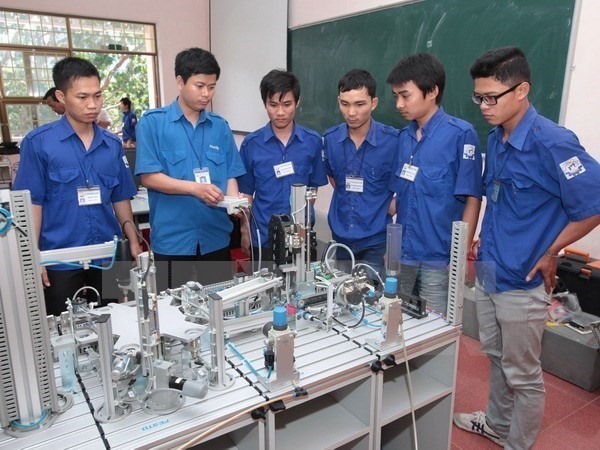 Society
Society

A majority of Vietnamese labourers may face unemployment in the next 10 years when industrial revolution 4.0 kicks in as their weak and outdated skills cannot meet the demand of enterprises.
 |
| Only 4.9 per cent of labourers spent their unemployment benefits on vocational training courses with desire to return to the labour market. — VNA/VNS Photo |
HCM CITY — A majority of Vietnamese labourers may face unemployment in the next 10 years when industrial revolution 4.0 kicks in as their weak and outdated skills cannot meet the demand of enterprises.
Vice president of the Việt Nam General Confederation of Labour Mai Đức Chính made the comment at a seminar organised by the HCM City University of Social Sciences and Humanities and the Friedrich-Ebert-Stiftung foundation on Thursday, with emphasis on the need to raise labourers’ awareness on their lack of skills.
Chính raised concerns over the professional skills of Vietnamese workers as the country enters industrial revolution 4.0, the current trend of automation and data exchange in manufacturing technologies.
He stressed that Vietnamese workers paid only little attention to self-improvement of their skills, citing the example that only 4.9 per cent of labourers spent their unemployment benefits on vocational training courses with desire to return to the labour market. More than 95 per cent utilised the money for other purposes.
It is predicted that some 45 per cent of electronic workers and 86 per cent of garment workers will become outdated during this revolution, he added.
Lê Đăng Doanh, former director of the Central Institute for Economic Management, stated that people in production will inevitably be replaced by machines. Therefore, the State and trade unions should support workers in bettering their technical skills and knowledge, or even get labourers equipped to do other work, Doanh suggested.
Vũ Thành Tự Anh, director of research at the HCM City-based Fulbright Economics Teaching Programme, also raised his concern over the rapidly aging labourers in Việt Nam, which is why it was necessary to start preparations right away to avoid a mass sacking of labourers in the future.
How to escape the trap of manufacturing production and cheap production but still improve the capacity and professional skills for workers is what policy makers needed to study carefully, he said.
Meanwhile, Trương Văn Cẩm, vice president and general secretary of the Việt Nam Textile and Apparel Association, proposed changes in education and training to increase labour quality.
The use of modern machines will help increase labouur productivity and improve the working environment, he said, suggesting the State devise preferential policies for businesses which use modern machines and maximise existing human resources. — VNS









